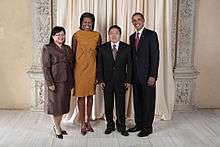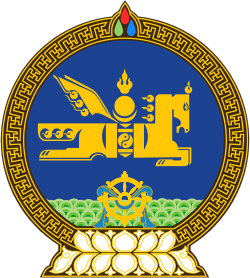Mongolia–United States relations
 |
|
Mongolia |
United States |
|---|---|


Mongolia – United States relations are bilateral relations between the United States and Mongolia.
According to a 2010 Gallup poll, Mongolians prefer the American leadership over that of China and India, with 58% expressing approval, 5% expressing disapproval and 37% uncertain,[1] and according to the 2012 U.S. Global Leadership Report, 44% of Mongolians approve of U.S. leadership, with 6% disapproving and 50% uncertain.[2]
As of 2014, there were 1444 international students of Mongolian origin studying in the United States.[3]
History
Due to Mongolia's previous close political and geographic ties with the USSR (who helped Mongolia achieve its independence from China) throughout the Cold War, there has been limited direct historical contact between the United States and Mongolia prior to the end of the 20th century. However, some immigrants came from Mongolia to the United States as early as 1949, spurred by religious persecution in their homeland.[4]
The U.S. Government recognized Mongolia in January 1987 and established its first embassy in that country's capital Ulan Bator in June 1988. The U.S. embassy formally opened in September 1988. The first U.S. ambassador to Mongolia, Richard L. Williams, was not a resident there. Joseph E. Lake, the first resident ambassador, arrived in July 1990. Secretary of State James Baker visited Mongolia in August 1990, and again in July 1991. Mongolia accredited its first ambassador to the United States in March 1989. Secretary of State Madeleine Albright visited Mongolia in May 1998, and Prime Minister Nambaryn Enkhbayar visited the American capital Washington, DC in November 2001. Deputy Secretary of State Richard L. Armitage visited Mongolia in January 2004, and Mongolian President Natsagiin Bagabandi came to Washington for a meeting with President George W Bush in July 2004. President Bush, First Lady Laura Bush, and Secretary of State Condoleezza Rice visited Mongolia in November 2005.[5] Defense Secretary Donald Rumsfeld visited in October 2005 and Speaker of the House of Representatives Dennis Hastert visited Mongolia in August 2005. Agriculture Secretary Mike Johanns led a presidential delegation in July 2006 in conjunction with Mongolia's celebration of its 800th anniversary. President Enkhbayar visited the White House in October 2007 and the two Presidents signed the Millennium Challenge Compact for Mongolia (see below).
The United States has sought to assist Mongolia's movement toward democracy and market-oriented reform and to expand relations with Mongolia primarily in the cultural and economic fields. In 1989 and 1990, a cultural accord, Peace Corps accord, consular convention, and Overseas Private Investment Corporation (OPIC) agreement were signed. A trade agreement was signed in January 1991 and a bilateral investment treaty in 1994. Mongolia was granted permanent normal trade relations (NTR) status and generalized system of preferences (GSP) eligibility in June 1999.
In July 2004, the U.S. signed a Trade and Investment Framework Agreement with Mongolia to promote economic reform and more foreign investment. In July 2007, six members of the U.S. House of Representatives visited Mongolia to inaugurate an exchange program between lawmakers of the two countries. The return visit came in August 2007, with five members of the Mongolian Parliament traveling to the U.S. In September 2007, the White House announced the proposed creation of an Asia-Pacific Democracy Partnership, in which Mongolia was invited to take part. The initiative is aimed at providing a venue in which free nations can work together to support democratic values, strengthen democratic institutions, and assist those who are working to build and sustain free societies.
The year 2012 was a significant year for the United States and Mongolia, as the countries celebrated their 25th Anniversary of Diplomatic Relations.[6]
US Assistance
The U.S. Agency for International Development (USAID) plays a lead role in providing bilateral development assistance to Mongolia. The program emphasizes one major theme: sustainable, private sector-led economic growth and more effective and accountable governance. Total USAID assistance to Mongolia from 1991 through 2008 was about $174.5 million, all in grant form. USAID Mongolia's FY 2007 budget of $6.625 million a year promotes: a) economic growth that support macroeconomic policy reform, energy sector restructuring, financial sector reform, and micro and small enterprise development; and b) governing justly and democratically by focusing on activities supporting judicial sector reform, electoral reform, parliamentary reform, and anti-corruption.

In most years since 1993, the United States Department of Agriculture has provided food aid to Mongolia under the Food for Progress and 416(b) programs. The monetized proceeds of the food aid ($4.2 million in 2006) are currently used to support programs bolstering entrepreneurship, herder livelihood diversification, and better veterinary services.
Mongolia has contributed small numbers of troops to coalition operations in Iraq and Afghanistan[7] since 2003, gaining experience which enabled it to deploy armed peacekeepers to both United Nations and NATO peacekeeping missions in 2005. With U.S. Department of Defense assistance and cooperation, Mongolia and the U.S. jointly hosted "Khan Quest 06," the Asian region's premier peace-keeping exercise, in the summer of 2006 and "Khan Quest 07" a year later. The U.S. has also supported defense reform and an increased capacity by Mongolia's armed forces to participate in international peacekeeping operations. Mongolia has also been designated as a "global partner" of the NATO alliance, of which the U.S. is a founding member, through the Individual Partnership and Cooperation Programme approved in 2012.[8]
The Peace Corps has approximately 100 volunteers in Mongolia. They are engaged primarily in English teaching and teacher training activities. At the request of the Government of Mongolia, the Peace Corps has developed programs in the areas of public health, small business development, and youth development. In 2005 and 2006 Mongolian Government officials, including President Enkhbayar and Prime Minister Tsakhiagiin Elbegdorj, requested significant increases in the number of volunteers serving in country. The Peace Corps has responded with a commitment to make modest annual increases until 2010. The program celebrated its 15th anniversary in 2006 with participation by President Enkhbayar.
The Millennium Challenge Corporation (MCC) completed negotiations for a Compact with Mongolia [9] in 2007 and the Compact was signed at the White House in October 2007.[10][11] By the end of the compact in September 2013, the Government of Mongolia and MCC had spent 94 percent of the anticipated compact funds to increase land security, reduce impacts of non-communicable diseases and injuries, provide enhanced vocational training, expand distribution of energy-efficient household products, and construct roads for commercial traffic. The Government of Mongolia and MCC expect more than 2 million people to benefit from the investments over the 20-year lifetime of the investment.[12] In December 2014, the MCC Board of Directors selected Mongolia for the development of a second compact. Currently, MCC and Mongolian officials are conducting an analysis of the country’s economy and constraints to growth.[13]
In August 2011, on a side trip while traveling to China and Japan, Joe Biden made the first visit by a sitting vice president to Mongolia since Henry Wallace made one in 1944.[14][15]
Economic interests
In March, 2011, six mining companies including Peabody of St. Louis, Missouri were preparing a bid for the Tavan Tolgoi area, the location of a substantial coking coal deposit.[16]
Biden's 2011 visit, according to Richard C. Bush of the Brookings Institution, may be able to encourage Mongolia's democracy and U.S. relations in the face of both Mongolia's predominantly natural-resource-driven political economy and its two powerful landlocking neighbors, China and Russia.[14]
Diplomatic Missions
Jennifer Zimdahl Galt was appointed Ambassador to Mongolia on September 15, 2015.[17] Previous ambassador Piper Campbell was the U.S. Ambassador to Mongolia from 2012 to 2015, succeeding Jonathan Addleton. For previous U.S. Ambassadors to Mongolia visit United States Ambassador to Mongolia.
Since December 7, 2012, the Ambassador from Mongolia to the USA is Bulgaa Altangerel, who succeeded Khasbazaryn Bekhbat. He presented diplomatic credentials on January 14, 2013.[18]
See also
References
- ↑ U.S. Leadership More Popular in Asia Than China's, India's Gallup
- ↑ U.S. Global Leadership Project Report - 2012 Gallup
- ↑ TOP 25 PLACES OF ORIGIN OF INTERNATIONAL STUDENTS Institute of International Education
- ↑ Ts., Baatar (1999), "Social and cultural change in the Mongol-American community" (PDF), Anthropology of East Europe Review, 17 (2)
- ↑ http://georgewbush-whitehouse.archives.gov/news/releases/2005/11/20051121-1.html
- ↑ http://mongolia.usembassy.gov/en_010913.html
- ↑
- ↑ NATO and Mongolia agree programme of cooperation 19 March 2012
- ↑ http://www.mcc.gov/documents/factsheet-102207-mongolia.pdf
- ↑ http://www.voanews.com/english/archive/2007-10/2007-10-23-voa2.cfm?CFID=207663617&CFTOKEN=61033568&jsessionid=6630fc86cd81feeba7148336526a30203c16
- ↑ http://www.usatoday.com/news/washington/2007-10-22-2067418468_x.htm
- ↑ https://www.mcc.gov/where-we-work/program/mongolia-compact
- ↑ https://www.mcc.gov/news-and-events/release/release-060115-statement-on-the
- 1 2 Robb, Greg, "The subtleties of Biden’s trip to Mongolia", MarketWatch, August 16, 2011, 11:10 AM EDT. Biden will also be visiting Japan on the trip.("Vice President Biden to Travel to China, Mongolia, and Japan", White House statement, August 04, 2011.) Retrieved 2011-08-16.
- ↑ "Joe Biden Takes on Mongolian Wrestlers [PHOTOS]", International Business Times, August 23, 2011 11:22 AM EDT. Retrieved 2011-08-25.
- ↑ Jin, Hyunjoo and David Stanway, "UPDATE 6-ArcelorMittal, Vale vie for huge Mongolia coal mine", Reuters, Mar 7, 2011 3:56am EST. Retrieved 2011-08-16.
- ↑ "Biography: Jennifer Zimdahl Galt", U.S. Department of State website. Retrieved 2015-11-05.
- ↑ "H.E. Mr. Bulgaa ALTANGEREL", Mongolian Embassy, Washington, D.C. website. Retrieved 2013-01-23.
![]() This article incorporates public domain material from the United States Department of State website http://www.state.gov/r/pa/ei/bgn/index.htm (Background Notes).
This article incorporates public domain material from the United States Department of State website http://www.state.gov/r/pa/ei/bgn/index.htm (Background Notes).

.svg.png)